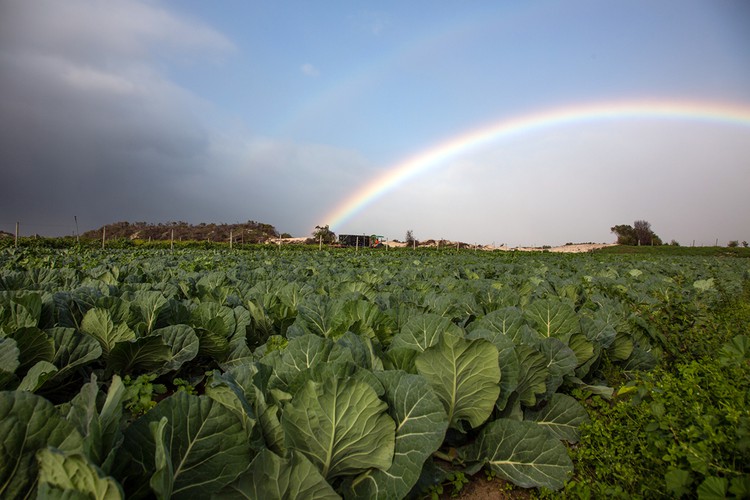
Most perverse of the effects of the lockdown is the fact that women farm workers, the producers of our food, do not have enough food to feed their families, writes Colette Solomon. Archive photo: Maryatta Wegerif
14 April 2020
On Thursday 9 April, President Cyril Ramaphosa announced that the lockdown to disrupt the transmission of Covid-19 would be extended until the end of April. While we understand and support this extension, farm workers, especially women, are already facing a crisis of hunger two weeks into the lockdown, largely because they have been unable to access two key sources of livelihood support that should have kicked in already, namely unemployment benefits (UIF) and social relief in the form of food parcels.
The last decade has seen not only a rapid casualisation and feminisation of agricultural labour, but increased job insecurity and precariousness.
After the introduction of the National Minimum Wage (NMW) in 2019, many farmers responded by reducing the length of time women were employed during the 2019/20 season. Many women seasonal workers did not know if, when and for how long they would be employed. The majority of seasonal workers on grape and wine farms in the Western Cape just finished the harvesting season in March. Most will now be without work until the next season starts in October. Their main source of income during the off-season is their unemployment benefit (UIF).
However, because all labour centres of the Department of Employment and Labour have been closed since the lockdown started on 27 March, seasonal workers have been unable to submit and process their UIF applications. The department has not put effective alternatives in place for farm workers to process their applications.
More than 100 women contacted the Women on Farms Project (WFP) during the first two weeks of the lockdown, sharing the impact of their inability to submit their applications in order to receive their UIF benefits, which are a statutory entitlement.
Jeanette, a woman seasonal farm worker from De Doorns, said, “During this time, we seasonal workers are dependent on our UIF money. Without our UIF, we are going to go hungry, especially me who is a single parent.
Anna, a farm worker from Rawsonville, said, “We haven’t got our UIF, plus many things are more expensive in the shops here in Rawsonville. How are we going to survive? The President must open the Labour Centres. He doesn’t know how we are suffering.”
Gina from Stellenbosch said, “Things are really difficult for us seasonal workers. We can’t get our UIF money. What is going to become of us?”
Challenges arising from farm women’s inability to access their UIF entitlements could have been mitigated if they at least had access to food parcels.
Both President Ramaphosa and Premier Winde of the Western Cape have announced an extension to the provision of food parcels. However, farm workers have been unable to access these much-needed food parcels, because the qualifying criteria and assessment mechanisms set out by the Department of Social Development do not reflect the extraordinary time in which we find ourselves and the urgency in getting the food parcels out to families in need.
For example, criteria include: “A person and their household who have insufficient means to sustain themselves during the lockdown period…”. By that criterion, all farm workers should automatically be eligible. However, the referral and assessment process is unnecessarily bureaucratic and impractical for our lockdown conditions.
Susan from Wellington said, “We heard about the food parcels, but we don’t know how to get it. Everyone here in New Rest is unemployed, so we all need food parcels”.
Magda from Ceres said, “Some people asked a ward councillor how we can get the food parcel. But he didn’t know. Please tell President Ramaphosa not to forget the farm workers.”
With the extension of the lockdown, President Ramaphosa stressed that “extraordinary measures” and “exceptional methods” will be needed. We call on government to take this opportunity to introduce transformational and structural measures, including land redistribution to farm workers and dwellers.
In the immediate short-term, the growing food crisis being experienced by women farm workers must be addressed. Farm women are calling on government to:
Making UIF accessible:
Social relief:
Covid-19 has exposed South Africa’s inequalities in wealth, healthcare, housing, water and sanitation, but surely the most perverse is the fact that women farm workers, the producers of our food, do not have enough food to feed their families.
Women’s names have been changed to protect their privacy.
Views expressed are not necessarily GroundUp’s.